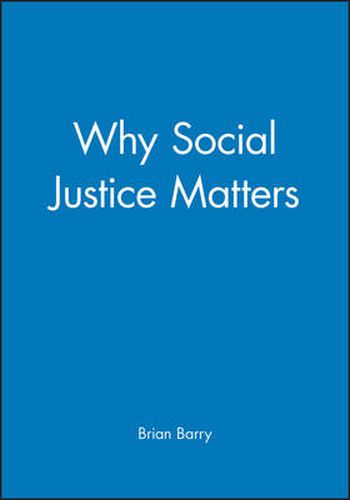Readings Newsletter
Become a Readings Member to make your shopping experience even easier.
Sign in or sign up for free!
You’re not far away from qualifying for FREE standard shipping within Australia
You’ve qualified for FREE standard shipping within Australia
The cart is loading…






In the past twenty years, social injustice has increased enormously in Britain and the United States, regardless of the party in power. At the same time, the idea of social justice itself has been subverted, as the mantras of personal responsibility and equal opportunity have been employed as an excuse for doing nothing about the enrichment of the few at the expense of the many and for making ever harsher demands on the poor and vulnerable. With grace and wit, Brian Barry exposes the shoddy logic and distortion of reality that underpins this ideology. Once we understand the role of the social structure in limiting options, we have to recognize that really putting into practice ideas such as equal opportunity and personal responsibility would require a fundamental transformation of almost all existing institutions. Barry argues that only if inequalities of wealth and income are kept within a narrow range can equal prospects for education, health and autonomy be realized. He proposes a number of policies to achieve a more equal society and argues that they are economically feasible. But are they politically possible? The apparent stability of the status quo is delusory, he responds: radical changes in our way of life are unavoidable. Whether these changes are for better or for worse depends partly on the availability of a coherent set of principles and a programme flowing from them that is capable of mobilizing the growing discontent with business as usual. That is, ultimately, why social justice matters.
$9.00 standard shipping within Australia
FREE standard shipping within Australia for orders over $100.00
Express & International shipping calculated at checkout
In the past twenty years, social injustice has increased enormously in Britain and the United States, regardless of the party in power. At the same time, the idea of social justice itself has been subverted, as the mantras of personal responsibility and equal opportunity have been employed as an excuse for doing nothing about the enrichment of the few at the expense of the many and for making ever harsher demands on the poor and vulnerable. With grace and wit, Brian Barry exposes the shoddy logic and distortion of reality that underpins this ideology. Once we understand the role of the social structure in limiting options, we have to recognize that really putting into practice ideas such as equal opportunity and personal responsibility would require a fundamental transformation of almost all existing institutions. Barry argues that only if inequalities of wealth and income are kept within a narrow range can equal prospects for education, health and autonomy be realized. He proposes a number of policies to achieve a more equal society and argues that they are economically feasible. But are they politically possible? The apparent stability of the status quo is delusory, he responds: radical changes in our way of life are unavoidable. Whether these changes are for better or for worse depends partly on the availability of a coherent set of principles and a programme flowing from them that is capable of mobilizing the growing discontent with business as usual. That is, ultimately, why social justice matters.